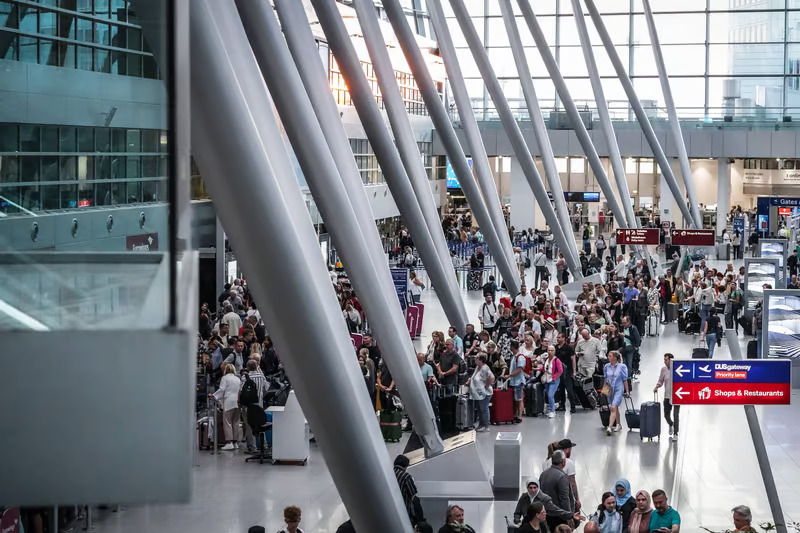Flying will become even more expensive from 2024
In order to fill the budget gap, the federal government wants to increase the aviation tax from 2024. What this means specifically for passengers.

Travelers at Düsseldorf Airport: The federal government is making flying more expensive from 2024.Photo: IMAGO/Jöran Steinsiek
Travelers will probably have to pay more for their flights from January. The traffic light coalition has buried the plans for a kerosene tax. However, the existing aviation tax should be increased.
The problem: Details of the extent to which the tax will increase are not yet known. So far, all that is certain is that the federal government wants to raise a total of 580 million euros in additional funds in this way. This should help fill the budget gap .
So far, the aviation tax has been staggered in three stages. For destinations up to 2,500 kilometers away, 12.77 euros per passenger and flight are charged; for routes up to 6,000 kilometers it is 32.35 euros and beyond that 58.23 euros. You have to pay for all commercial flights that take off from German airports . The decisive factor is the flight destination stated on the ticket. Pure connecting flights are excluded.
Flight tickets: Taxes could increase by a good 50 percent on average
It is unclear how much these individual amounts should now be increased. A simple calculation can provide a rough guide: So far, the state has collected a good one billion euros per year from the levy. If it is to be 580 million euros more in the future, the levy would have to increase by a good 50 percent.
According to this calculation, the rate would rise to just over 19 euros for the shortest route and to around 88 euros for the longest route. But the new regulation probably won’t be that simple, as the number of flights is not evenly distributed across the three distance classes.
Theoretically, for example, the government could increase the rate disproportionately for short distances of up to 2,500 kilometers. This would particularly affect the Lufthansa Group with its strong presence in Germany and Europe as well as the low-cost airlines Ryanair and Easyjet . The latter two fly predominantly within Europe.
Lufthansa competitors such as Emirates , Qatar Airways and Turkish Airlines would do better here. The question is therefore whether the traffic light government will opt for such a solution.
However, one thing is already clear: the additional costs will be borne by the passengers. At Lufthansa, for example, it says: With 15 euros per passenger remaining as profit for the company after deducting all costs and fees, there is no scope to compensate for a larger increase in the tax. Other airlines such as Easyjet will probably pass on the additional costs.
Uncertainty regarding tickets for the first half of the year: Do customers have to pay additional money?
Another big problem: The airlines have already sold a lot of tickets for the first half of the year. The customers have already paid for them. In aviation , advance payment is common practice worldwide. Nobody currently knows what happens to these tickets. Do customers now have to pay more?
“Just twelve days before the start of the new year, there is still no binding regulation as to how and to what extent taxes , duties and fees will be charged for air travel departing from German airports in the coming year,” says Easyjet. There is a lot of uncertainty about air traffic in Germany.
The frustration in the industry about the traffic light government’s plans is correspondingly great. There is talk of “unprecedented and irresponsible ad hoc governance through press statements” at Easyjet.
“Instead of raising incentives for intermodality by increasing the VAT on domestic German flight tickets, the additional income will now – contrary to what was guaranteed in the coalition agreement – not be used for investments in industry-related future investments,” said Stephan Erler, responsible for Germany and Switzerland at Easyjet. Instead, self-inflicted budget holes would be filled.
According to Easyjet, an increased tax will not help against climate change. Because of the additional costs, fewer tickets would probably be booked and the jets would fly with less capacity. Emissions per passenger could therefore even increase.
The Federal Association of the German Aviation Industry also criticizes the government’s decision. The tax burden for air transport is already highest in Germany compared to other European countries. Even higher fees would be at the expense of the service and would shift traffic to other hubs . The connection between Germany and important economic regions will continue to suffer.
